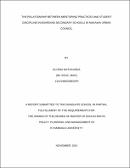| dc.description.abstract | The purpose of the study was to establish the relationship between mentoring practices and student discipline in boarding secondary schools in Nakawa Urban council. The study was motivated by the undesirable student discipline in the educational institutions in Uganda, leading to questioning how undesirable it was and it relates to mentoring in boarding secondary schools in Nakawa Urban council, Kampala. The specific objectives of the study were to (1) find out the relationship between student orientation and students’ discipline; (2) establish the relationship between holding one to one guidance and student discipline; (3) investigate the relationship between mentee evaluation and giving feedback and students’ discipline; (4) find out the relationship between role modelling and student discipline in boarding secondary schools in Nakawa Urban Council. This study employed a cross-sectional survey design. Access population comprised of 482 respondents consisted of, 3 head teachers, 120 teachers, and 360 students. This study adopted stratified, purposive and simple random sampling techniques in selecting the sample for the study. The main data collection tools were questionnaires and interview guides. This helped to gather quantitative and qualitative information which were coded and measured on a five-point Likert scale. Data analysis was handled using Statistical Package for Social Scientists software package version 21 to generate frequencies, percentages, and charts from which description of the findings was derived.The collected data was analysed using the narrative, descriptive, data transformation, Pearson correlation and linear regression methods. The study revealed a significant relationship between mentoring practices used in the selected schools and student discipline but was not strong enough to eliminate all forms of indiscipline. Findings showed that the practices used to mentor students included students orientation, one on one guidance and counseling, role modelling, encouraging the mentee to make wise choices, mentee evaluation and giving feedback. For most of the students, academic discipline was good in terms of doing classroom work, homework, and exams, but it was below expectations in terms of regularity and punctuality for classroom and school activities. The study concluded that the relationship between mentoring practices that were used in the selected schools and student discipline was positive and significant. The research recommended that head teachers and teachers of the secondary schools in urban council should use mentoring as a tool for improving student discipline. | en_US |

